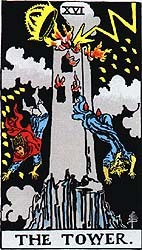Religion as we have known it is breaking down. The evidence is everywhere we look. It is in the despicable rhetoric and violence of politically-oriented religious extremists, far and near. It is in the scandals and abuses plaguing our current ecclesiastical structures. It is in the surface tension between the "religious right" and modern culture, in the growing indifference of that culture to religion and its occasional disgust with it. And yet, I want to make it really clear: It is not religion itself that is so evidently coming apart in all of these examples; it is an old and outworn idea of religion as an-end-in-itself, as an idol that has -- for far too long -- been mistaken for its maker and its goal. It is that idol which is now being broken. No, religion will go on; it is how we relate to it that will change, and must change if we are to reclaim its genuine usefulness to us.
Over a century ago, the Russian philosopher, P. D. Ouspensky, explored the symbolism of "The Tower" in the Tarot deck as an important metaphor for religion. The tower, he said, was begun in a time before memory, as a monument to the sacred, a reminder of the true tower in each of us, its every level representing a level to be climbed on the inside. But even before the foundations were fully laid, some of the builders began to "believe in the tower of stone they had built," and to teach others to believe in the same. To them, the tower was itself sacred, and they soon tried to control access to all its doors and windows, and to occupy the summit and the very "rights to heaven," as they saw it. They even began to fight over these rights in their confusion. Thus, of all the people of the earth, the worshippers of the tower were the most surprised when heaven spoke from beyond its walls in the form of a lightning bolt, sending its priests sprawling to the ground where they lay helpless amid the rubble. Now, says Ouspensky, all who look on its ruin and see its broken summit -- open to heaven as it always should have been -- know not to believe in the tower.[1]
As the metaphor suggests, the real issue is one of remembering the original function of the tower, of maintaining one's awareness of the true meaning and purpose of religion, i.e., that it is a reminder of the sacred. The problem is, it is just so easy for us to forget that religion is not itself sacred, but merely a vessel for the sacred. Although, truth be told, I wonder how many people ever made the distinction in the first place. I don't think I would be going out on a limb to say that religion is not well understood in our culture. Often, it is assumed to be "right" and "necessary" by the religious, or "backward" and "unnecessary" by the secular; but how many people really know anything about it in itself, about its function, or how it works? How many people, religious or secular, can actually give a working definition of religion? Perhaps if we really knew something about the true end of religion, we might better understand why religion as we have known it is currently breaking down, and more importantly, get a glimpse of what is currently evolving -- namely, the religion of spirituality.
But let me back up a step and propose a working definition of religion:
Religion is a sociological construct meant to take us back to the primary experience from which it arose; it enshrines an ideal and provides one with a structured approach to spiritual awakening.
That is to say, religion is what follows in the wake of the spiritual luminary's breakthrough experience; it is what happens after Muhammad receives his revelation, or the Buddha his awakening; it is what their disciples cobble together from reports of those experiences, using them to make a 'map' to lead themselves and others back to the source experience. As the Buddha himself taught: religion is like a raft one makes and uses to cross a river; once you are on the other side, you needn't to carry it around on your back![2] Religion is just a means to an end, not the end itself.
We must always remember then that the map is not the sacred territory; it must be used by us (though with its original purpose in mind) and not the other way around. As the brilliant Rabbi Zalman Schachter-Shalomi once put it (while commenting on the abuses of various religious extremists), "Good religion puts itself in the service of God; bad religion puts God in the service of religion."[3] It is the latter that usually has us so upset with religion, that causes us to question its foundations, and which is the cause of all that seems to be breaking down in religion. But this is religion misused and misconstrued. It is a false religion that puts the sacred in its own service. False religion is to true religion what the cancerous cell is to the healthy cell. It is this imposter that provokes our most vehement objections, and which now has us looking up at a broken tower and boldly declaring, "A new day for spirituality!" (while we wave goodbye to the "old-time religion").
(This is part one of a three-part series of articles on The Religion of Spirituality. The second part will be called, "Spiritual and Religious.")
References:
1. P. D. Ouspensky, The Symbolism of the Tarot: Philosophy of Occultism in Pictures and Numbers, tr. A. L. Pogossky, New York: Dover Publications, 1976: 48-49.
2. "The Raft Simile" in the Pali Alagaddupama Sutta.
3. Heard directly from Schachter-Shalomi after he gave a Yom Kippur sermon at Makom Ohr Shalom in Los Angeles, California, in which he used this formulation for the first time, ca. 2009.

